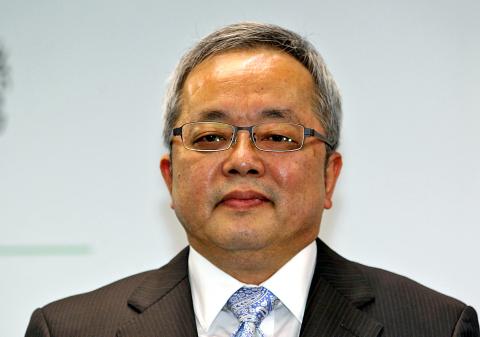Premier Lin Chuan (林全) has appointed Shih Jun-ji (施俊吉) as the new chairman of the Taiwan Stock Exchange (TWSE), Cabinet spokesman Tung Chen-yuan (童振源) said yesterday.
The appointment came amid speculation that Shih, an experienced academic and veteran of Taiwan’s financial regulatory agency, would replace Lee Sush-der (李述德), who is scheduled to retire at the end of this month.
Tung said that Shih, currently a minister without portfolio, has a wealth of experience and a good reputation in both economic theory development and financial market practices, making him a good candidate to take the helm of the TWSE, which operates the local main board.

Photo: CNA
Shih formerly served as chairman of the Financial Supervisory Commission (FSC), the top financial regulator in Taiwan, and was a research fellow at Academia Sinica, the nation’s top research institution.
Shih was born in August 1955 and has a doctorate in economics from National Taiwan University. As a minister without portfolio, he is in charge of policies regarding economics, communication and trade negotiations, including possible talks on entering the US-led Trans-Pacific Partnership.
Citing Lin, Tung said that the TWSE chairman plays an important role in the capital market, as Taiwan is keen to attract funding at home and from overseas to energize its capital market.
Tung said that when Shih served as FSC chairman, he worked closely with the domestic financial market.
As a research fellow at Academia Sinica, Shih has conducted a great deal of research on Taiwan’s financial market, Tung said.
He said Shih has done a good job as a minister without portfolio and his expertise in the financial market makes him ideal for the position of TWSE chairman.
After Shih assumes his new post, he is to step down from his position as minister without portfolio.

NEW IDENTITY: Known for its software, India has expanded into hardware, with its semiconductor industry growing from US$38bn in 2023 to US$45bn to US$50bn India on Saturday inaugurated its first semiconductor assembly and test facility, a milestone in the government’s push to reduce dependence on foreign chipmakers and stake a claim in a sector dominated by China. Indian Prime Minister Narendra Modi opened US firm Micron Technology Inc’s semiconductor assembly, test and packaging unit in his home state of Gujarat, hailing the “dawn of a new era” for India’s technology ambitions. “When young Indians look back in the future, they will see this decade as the turning point in our tech future,” Modi told the event, which was broadcast on his YouTube channel. The plant would convert

‘SEISMIC SHIFT’: The researcher forecast there would be about 1.1 billion mobile shipments this year, down from 1.26 billion the prior year and erasing years of gains The global smartphone market is expected to contract 12.9 percent this year due to the unprecedented memorychip shortage, marking “a crisis like no other,” researcher International Data Corp (IDC) said. The new forecast, a dramatic revision down from earlier estimates, gives the latest accounting of the ongoing memory crunch that is affecting every corner of the electronics industry. The demand for advanced memory to power artificial intelligence (AI) tasks has drained global supply until well into next year and jeopardizes the business model of many smartphone makers. IDC forecast about 1.1 billion mobile shipments this year, down from 1.26 billion the prior

People stand in a Pokemon store in Tokyo on Thursday. One of the world highest-grossing franchises is celebrated its 30th anniversary yesterday.

Zimbabwe’s ban on raw lithium exports is forcing Chinese miners to rethink their strategy, speeding up plans to process the metal locally instead of shipping it to China’s vast rechargeable battery industry. The country is Africa’s largest lithium producer and has one of the world’s largest reserves, according to the US Geological Survey (USGS). Zimbabwe already banned the export of lithium ore in 2022 and last year announced it would halt exports of lithium concentrates from January next year. However, on Wednesday it imposed the ban with immediate effect, leaving unclear what the lithium mining sector would do in the